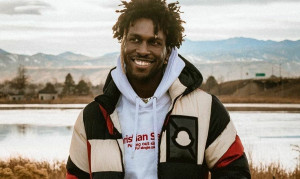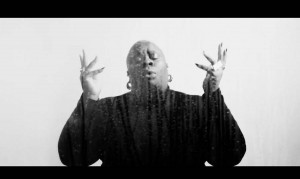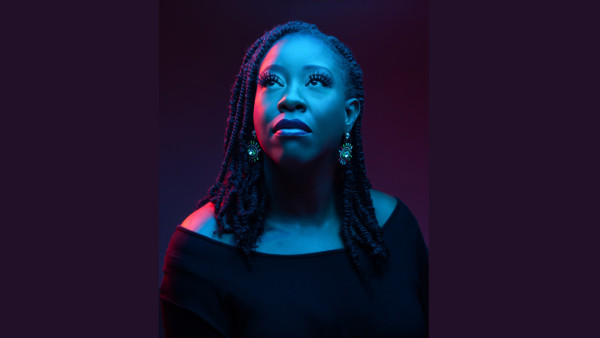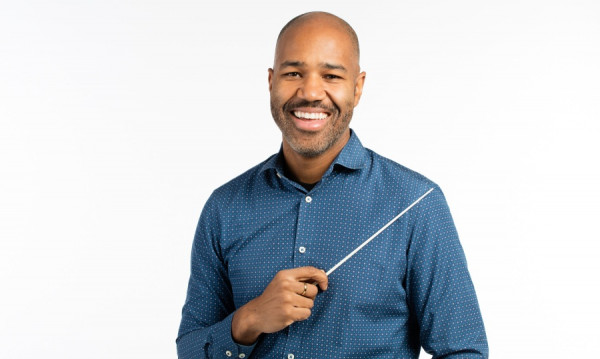Communicating via Zoom (as has become custom during the 7+ month pandemic), Shakura and Daniel clue us in about how they’ve managed to create a brand new (and safe) way to enjoy Orchestral music blended with the magic of the pioneering Soul, Rock, and R&B songstresses and musicians of our culture.
What was it like starting a music career in Canada?
Shakura: For me starting a music career in Canada has been one of the greatest blessings of my life. I’m part of a smaller pool of fish, you know, in the music I’ve chosen to pursue... there’s definitely a smaller pool that I’ve had to fight against. And I think also there’s this thing in Canada where sometimes people are too polite or hesitant to block you if you act like you belong. And so in those moments when they’re hesitating, I’ve used those to my advantage to slip in. I think also growing up in Canada even understanding the fact that there is still systemic racism that we’ve grown up with and that’s been a part of my life throughout my life in Canada there’s still an openness that I’ve been able to enjoy... I’ve played in most of the folk festivals in Canada if not once then twice, or three times some of them. I’ve met such a variety of musicians that it’s only broadened my understanding of my musical ability and personality, so it’s been good for me. I’ve enjoyed it.
Daniel: Starting a career in music is difficult. There’s a lot of work, a lot of uncertainty, and a lot of hustle. And in that way it’s the same here as anywhere else. Canada has a really wonderful music scene so I’m really glad that I was able to start my music career here because there are a lot of opportunities that were afforded me that wouldn’t have been afforded in other places. For example, growing up in Alberta there were musical instruments for rent in school. Basically, the government took care of that. So as a result I was able to have an instrument at a time when my family was not able to afford the instrument I was playing. That was just given to me by the school. I could take it on the bus, I could take it home, I could practice. Had I been in a place where music education was not standard, where music education was not a priority, I would not be where I am today. And that is a result of policies having been put into place decades before I ever became a student. While the work of becoming a musician itself is difficult, the opportunities that you have as a result of being in Canada are pretty tremendous.
What were some of the obstacles you’ve had to overcome?
Shakura: I think there’s this trope of Black women that I’m constantly battling against either consciously or subconsciously… how I conduct myself in business... I’m a businesswoman, you know, this is not just something that I love in terms of art but this is my business. I run bands from two pieces all the way to thirteen pieces. I plan tours, and I produce records and I produce shows. And I always have had to straddle this line of being strong but not strong enough to intimidate, not strong enough to seem “a bitch” not strong enough to make people feel like I’m being “too aggressive” or “too assertive” or “too overbearing” and that’s been a constant hurdle. My mother was my manager up until a couple of years ago and I saw how people reacted to her and her belief in me. And her commitment to me… “wow, she really thinks you’re something” or “wow she really thinks highly of you” because of what she was asking for, what our fee was, you know, what my boundaries were in terms of performances. And I know that a lot of that was not just because she was my mother it was because she was a Black woman from Brooklyn, New York saying “she’s not coming in there for this small of a fee. If you want her you’ll have to pay more.” That’s been the biggest obstacle for me. Really working hard at “corporate speak” you know, and code-switching and maintaining my integrity and my self-respect at the same time.
Daniel: Orchestral conducting is incredibly competitive. There are just so many people, so I guess one of the major challenges is the necessity of constantly improving oneself, constantly improving one’s craft. It’s a sort of job that you’re always perfecting. So to get to the next level, you have to do the work yourself and you also have to figure out what the work is that you need to do for yourself. You don’t upgrade yourself in the arts, other people upgrade you… so no matter what’s written in your bio you still have to perform even better the next time. That’s the constant challenge of being in the arts, I would say.
What inspired you to start your career? What inspires you to keep going today?
Shakura: “What inspired me to start my career… I had a teacher in high school, Mrs. Kadak, who looked like a Mary Poppins, what I thought a Mary Poppins would look like. She was tall, had jet black hair, wore red, red lipstick, and was just overly dramatic... she had wind that followed her everywhere so her capes and her clothing was always, like, you know, in the wind. Mrs. Kadak taught me theatre in grade ten or eleven onward. I used to do these monologues — in order to get your exam mark you had to perform a monologue — my first one was from To Be Young, Gifted, and Black and my second was from For Colored Girls — “when the rainbow isn’t enough.” After giving me 100%, and it was the first time in her career that she had given any student 100% on both the monologues, she said “you should be a singer” because I sang and created music that went along with both of the monologues. I said “I like singing but I really want to be an actor. I think that’s where I fit.” And she said “oh, you’ll always be an actor. But you need to sing!” And because she was Mrs. Kadak and my version of Mary Poppins and, you know, she had this breeze that followed her I went “okay.” And it took me six months into grade thirteen that I went to my parents to tell them I wasn’t going to Carleton University to be a language interpreter… I was going to be a singer because Mrs. Kadak had deemed it so. And my parents went “okay.” And I went off to Sheridan College and that lasted for a year. Then I just ended up in the Toronto scene. One of my first times out at a jam session was in front of Dougie Richardson, Kingsley Etienne, Betty Richardson and Archie Alleyne. And those four people epitomized for me what the music scene was back then. They mentored me, they took no crap from me, they accepted only my best, and nothing less. And they allowed me to learn who I needed to be in this industry in terms of professionalism, in terms of integrity, in terms of musicianship… that’s really how I started. They inspired me to really want to be my best at this.
What’s kept me going, you know, through their tutelage as well as people like Jackie Richardson, Salome Bey, Joe Sealy, Denis Simpson who’s now recently passed, Vera Cudjoe, Eric Bibbs… all of these people. At that age, I didn’t know whether they were successful or not. I see now that they probably were successful in a way but they weren’t as successful as they should have been. But what I did know is that they were successful in a way that made sense to me. They were happy, they were connected as a community. They were doing something that they loved. They were performing in front of people. And they were Black. So those have been the things for me that inspire me to keep going. I want to connect with my Black communities. I want to make sure that I’m happy.
Daniel: I was inspired by the experience of creating music. And the experience of listening to music that I really connected with. That’s what inspired me when I was twelve, when I was ten. And that’s what continues to inspire me today: the experience of listening to and performing amazing music. Add to that the experience now of working with world-class musicians on a regular basis is something that once you’ve done once, you can’t ever come back from… it’s just a life-changing experience working with musicians at this level, it’s phenomenal.
How has the coronavirus impacted your work? it doesn’t seem like the pandemic has impeded your journey — how have you been coping career-wise and in everyday life?
Shakura: The coronavirus has allowed me to pivot. I see what other people call “roadblock” as an opportunity to pivot. To move differently, to open your mind to a different way of thinking, often adapting. And for the first two months, I basically sat on my couch, you know, Netflix and popcorn. Other people were like meditating, baking bread… I was eating bread, I wasn’t baking nothin’! And then I started meditating and then I started walking up to two hours every single day in nature. I made a lot of changes in my life in the past six months that I am so happy with… the coronavirus has allowed me to see who I can be. And also to see who I am, you know? It’s the bad times, it’s the challenging times, that show your true character, your true spirit. And I’m proud of the child that my mother raised. I’m proud of the child that my father led because… I’ve done some really cool things. I have a group of Black female musicians, we meet twice a week, from America and Canada, and we sit and we talk and we laugh and we share and we experiment with each other, and it’s all done by Zoom. I’ve done masterclasses that have only become available because of COVID. I’ve changed how I look at myself career-wise, I’ve changed what I’m doing career-wise, I’m offering workshops… I’m strong. Strong in a good way. I feel sad for the fact that it’s taken this, and the loss of so many people and the loss of so many opportunities to create this mold. But I feel grateful that I’m still able to create something through it.
Daniel: ALL of my concerts for this year have been cancelled… that’s the same as everybody, however, one of the differences is that I’ve had a number of guest conducting appearances that have happened so I haven’t lost all of my income… and yeah, I mean coronavirus has really… it stopped everything. We’re an industry that basically plans for at least a year, usually two, three years out. Now things are being finalized two weeks before, the week before… it’s very, very difficult, very challenging. It’s requiring a great deal of ingenuity, it’s requiring a great deal of patience with each other, from all of us. It’s requiring a new level of attention to details and consideration for other people’s tolerances of what they might consider safe or unsafe… what I might be okay with somebody else might not be… how do we still work together? How do we sit together? How do we be together in this way? Should we be together? These are new questions that we’re having to confront. So it’s been a challenge career-wise. For myself, personally, I’ve just been trying to do as much work as I can to stay on top of my own practice. Reading, studying, learning languages, “trying” to stay fit — it worked for a while, and then isolation hits and then you do what you can… Everyday life has been a lot of Italian food, a fair amount of Netflix, a lot of workouts! And a lot of just playing music at home, too.
What’s the significance of the Toronto Symphony Orchestra, the First Ladies of Soul event, and the choice of soul singers? Why them? Why now?
Shakura: To have an opportunity to work with the TSO… I think it’s one of the largest, if not, the largest orchestras in Canada... to have an opportunity to once again work with Daniel Bartholemew-Poyser — that man is so on point! So smart, he’s so committed, he’s so inspiring... to have the opportunity to work with him on this stage is bigger than huge, it’s monumental! We did this show two years ago with the Kitchener-Waterloo Symphony, and the best part of the two nights was — we’re in Kitchener-Waterloo, it’s Oktoberfest, and there’s still people in the theater even though it was Oktoberfest outside! I think we were two-thirds full, which I will accept, I will take! And Daniel and I started speaking German to each other, and the crowd went crazy… this idea of two Black people from Canada playing Classical music, speaking German to each other and then busting out with some Beyoncé moves afterwards… that’s Canada to me… that’s beautiful. I think it’s timely… I also think it’s about time. I think it’s about time that I’m there. I accept that I’m ready for this. I accept that it’s gonna be a lot of fun. I accept that I stand on the shoulders of people like Jackie Richardson and Salome Bey and Joe Sealy and Archie Alleyne, and all of these amazing elders who prepared me to be on that stage. For me it’s a really big deal.
There is such erasure going on right now when it comes to music that is indigenously Black, whether it be R&B, whether it be Soul, whether it even be Reggae or Ska, or Blues… I don’t think that anyone who’s playing this music should stop. I think music was meant for the masses. I think that’s the way we grieve, that’s the way we love, that’s the way we laugh, you know? There’s grace in that. What I do have a problem with is a lack of acknowledgment as to where this inspiration comes from. A lack of acknowledgment of who I need to bring with me when I’m doing this music. It’s been happening since the beginning of time with our music. Others have taken it and gone to places we were not accepted. So for me, it was really important to pay homage to women who led the way for everyone else to take up the baton and run forward whether they be Black or White, male or female. So people like Sister Rosetta Tharpe who is the grandmother of Rock and Roll… she was the first guitarist to use distortion. She travelled and toured all over. She inspired Chuck Berry, Elvis Presley, Little Richard, Johnny Cash, all of these musicians and more, and yet, up until a couple years ago nobody knew her name... a lot of people still don’t. How is that possible when everybody knows who Stevie Ray Vaughn is and goes and visits his grave every year? How is that possible when Graceland is one of the most visited homes, you know, in history? And yet nobody knows her name. There’s no picture of Sister Rosetta Tharpe in Graceland, is there? Know what I mean? We’re being erased. So for me that was really important… to show the root of my inspiration but also the root of a lot of the inspiration that we as musicians — Black, White, male, female, non-gendered — have gone and moved forward with. Chaka Khan, Whitney Houston, Tina Turner, Aretha Franklin, Ella Fitzgerald… I have two or three originals in there as well… it’s important to me. This is where we came from.
Daniel: This is one of our first events in a new format. Something in terms of orchestral ingenuity we’ve had to invent as a way to stay connected to the public in a safe way. Drive -in concerts — it’s a new format, it’s a new thing. It’s gonna be spectacular, you know… matching the singer with the music, matching the singer with the venue, matching the music with the mood, with what we as people need right now: fantastic music, inspiring lyrics… it’s great. So it’s just one way that orchestras are becoming more inventive about how we produce music, about how we bring music to people that need to hear it.
This is a concert that we’ve toured around. A couple of years ago we thought it was important that people know Sister Rosetta, and Big Mama Thornton, and Ella Fitzgerald, and Billie Holiday, and Nina Simone... Think of the lyrics of Strange Fruit. Three years ago when we did this concert it was really appropriate, and it’s even more appropriate now. Strange fruit is growing all over North America. These women, what they accomplished in their time, whether we’re talking about Sister Rosetta, or Chaka Khan, Tina Turner, Beyoncé… what they have accomplished is tremendous and we wanted to honour that and we wanted to showcase that. The music is amazing, the music is fantastic… Hound Dog, Natural Woman, I’m Every Woman, these are pieces of music that everyone can just come and love, but it’s the story behind it, the women behind it, the lives behind it, the legacy behind it that gives the concert real grounding, real depth, real spirit.
When you think about the Toronto Symphony Orchestra, artists like Whitney Houston and Beyoncé don't exactly come to mind. What does a "symphonic tribute" like this look like? What does it take to translate Soul music for the symphony?
Shakura: Think about Ray Charles, think about Etta James… when you listen to their music, the arrangements that go on… a lot of times when we’re listening to music we listen to the words, we listen to the melody, and we sort of bop along with it. We don’t actually take it apart in our ear. Nina Simone was a Classically trained pianist. When you listen to her music, the arrangements, they’re Classical. Make no mistake about it. Ray Charles, all those strings and huge orchestral arrangements in there… what Quincy Jones has been doing for years with Michael Jackson and everybody else that he produced… he’s been putting in string arrangements in all of that stuff. So what we’re doing is just putting it to the forefront in a way that you might not have considered it before. You might not have realized this is what you’ve been hearing the whole time! You just didn’t know… your ear didn’t recognize it, you didn’t take it apart. We’re gonna take it apart and put it back together on stage so you can see it! What does it take to translate Soul music for the symphony? It takes great arrangements done by great arrangers… one of whom is Lance Anderson, a colleague of mine who was in my band for years and I was in his band for years. He’s somebody who I consider a musicologist. He’s somebody who’s worked with Oscar Peterson on putting together a “how to play like Oscar” DVD. He’s someone who regularly employs people of colour, consciously, and has vowed to make that even more intentional… meanwhile he’s playing this music. He’s always been involved in my projects as one of the arrangers of my Classical pieces. He understands how to keep the integrity of the Soul music while marrying it with the Classical instruments that are going to be there. We’re also going to be featuring Roger Williams on bass, who used to play with Billy Black… he is a Blues, R&B, Reggae bassist. So having him there will create a lot of gravitas that we know is needed in this music. And Daniel, he understands this music, he’s grown up with this as well as his entire repertoire of everything else. It takes understanding that these things belong together. This isn’t something that intimidates, it’s something that inspires.
Daniel: Well, this question I thought was interesting… Nina Simone was a classically trained pianist, right, and that’s a fact. Whitney Houston has orchestral strings in so much of her music. There are quotes in Beyoncé’s album LEMONADE from Swan Lake, which is by Tchaikovsky. So I think it’s just the trope, you know? “Oh, Classical music and Black people have nothing to do with each other” — it’s simply not true. Orchestral instruments are used in all this music and it has been for so long… orchestral music is everywhere — orchestral instruments are absolutely everywhere. Chances are if you put on a CD of Soul music you’re gonna hear a trumpet. That’s an orchestral instrument! These instruments are everywhere. In terms of translating it for the symphony, it’s really not that difficult. It’s what we do as musicians. These things go together, absolutely.
The First Ladies Of Soul concert is scheduled for this Saturday evening (October 17th, 2020) at 8:00 pm at the CityView Drive-In. For more information on the show, visit tso.ca.
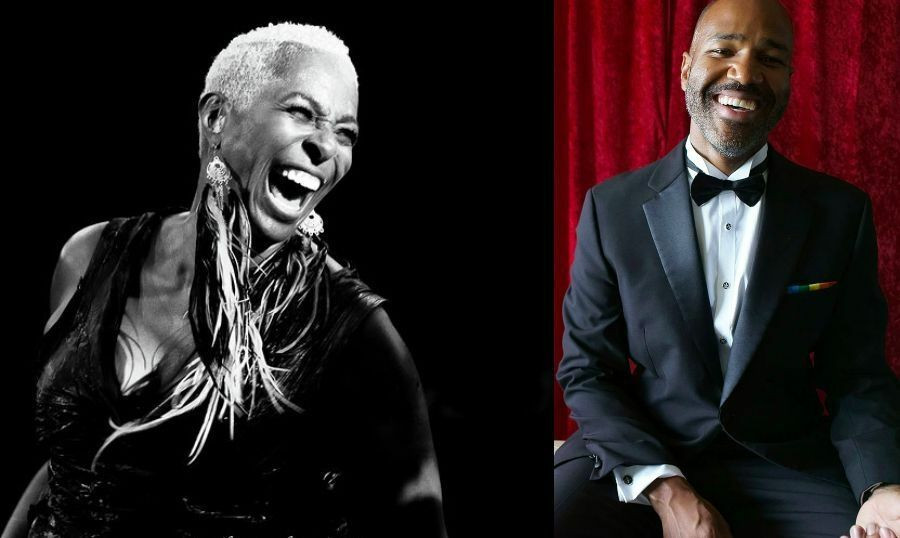
 By
By 




